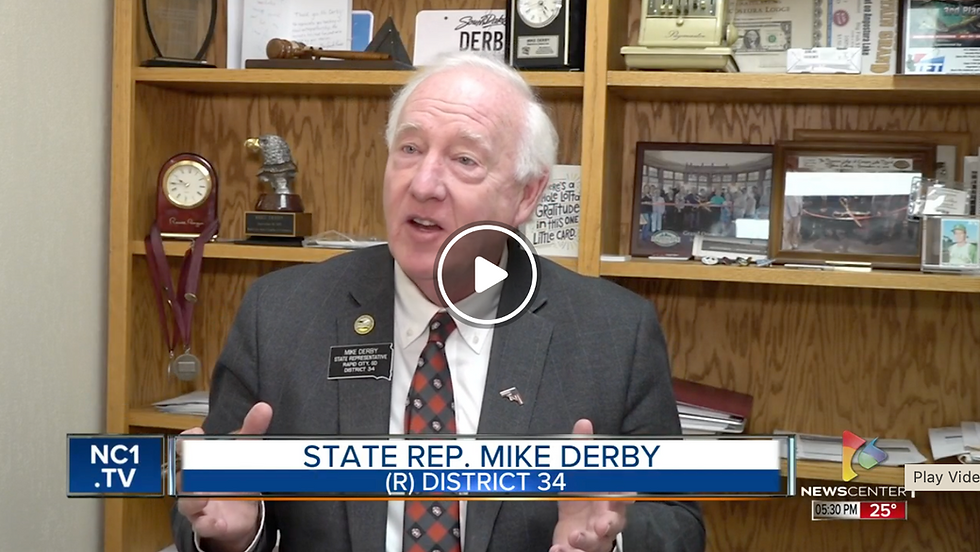Abortion one of top four issues to be discussed in upcoming South Dakota Legislative session
- David Azadi Scott, NewsCenter1
- Jan 4, 2024
- 3 min read
Representative Derby says legislators plan to look at current abortion laws ahead of the vote on the ballot initiative saying, “Currently South Dakota has one of the toughest abortion statutes in the country and so we’ll be weighing what’s being proposed with what our current situation is in regards to that.”
Please click on the photo above to view the video on NewsCenter1.tv
RAPID CITY, S.D. – The 2024 legislative session starts Tuesday, Jan 9, and state lawmakers will have some major issues to tackle before the session ends in March. Mike Derby is the State House representative for District 34, representing Western Rapid City. He is also the Chairman of the House Committee on Appropriations and the Co-Chair of the Joint Committee on Appropriations. Representative Derby said 102 bills have already been filed ahead of the session and he expects both chambers to look at several hundred more in the weeks to come. Here are some of the major items he discussed.
Four Issues to look for:
ABORTION
In June 2022, Roe v. Wade was overturned in a controversial decision by the Supreme Court of the United States, leaving the decision to ban or allow abortions up to state governments. Since then it has been a hot-button issue and states have enacted abortion bans or protections independently. South Dakota currently bans abortions, but a constitutional amendment that would restrict the state’s ability to restrict abortion access may end up on the ballot in November.
Representative Derby says legislators plan to look at current abortion laws ahead of the vote on the ballot initiative saying, “Currently South Dakota has one of the toughest abortion statutes in the country and so we’ll be weighing what’s being proposed with what our current situation is in regards to that.”
CLARIFICATION ON CONFLICTS OF INTEREST
Two west river legislative seats – senate district 35 and the second house district 34 seats – are currently empty. Governor Kristi Noem will need to appoint representatives to fill those seats but has made it clear she is unwilling to do so until the constitutional rules regarding conflicts of interest have been clarified. The South Dakota supreme court will work in an advisory capacity with the state legislature to clarify those guidelines during session. Derby said getting leadership for those districts is critical adding, “We need to get people in there as soon as possible – for a variety of reasons. We need to train them. We need to get them going on the legislative session. They’re going to be dropped – kinda parachuted – into the session with not a lot of training and those districts need that representation.”
He said there is a clear need to clarify what constitutes a conflict of interest but noted there are a lot of questions up in the air about what it will look like to clarify the conflicts of interest rules saying, “Questions like – spouses – where do spouses work? Where does that play into it? Does it have to be an actual contract signed by a legislator? What are the conflicts? So, it will be a big deal.”
EMINENT DOMAIN
Eminent domain is the term used for the federal government’s authority to seize private property and convert it for public use. The US can do so under the constitution but is required to provide just compensation to the property owner. Utility companies have power as “common carriers” to exercise eminent domain to gain access rights to land where landowners may be otherwise unwilling to grant it. State lawmakers are looking to define what that means. Derby said, “I think the one big issue is the definition of a common carrier. What is a common carrier? Is it electricity, water, and CO2 in a pipeline? Are we going to tighten that up? What are the pros and cons of allowing a private entity to have eminent domain that’s usually used by utilities?”
SALES, GROCERY AND PROPERTY TAXES
Several tax issues are on the table during this year’s legislative session. Representative Derby said the sales tax was reduced last session by three tenths of a percent, or about $104 million. The tax sunsets in four years and lawmakers will need to decide on whether or not to make the sales tax reduction permanent. He says other important tax issues may need to be decided as well adding, “We’ll see if the Governor – or anybody else – brings forward a repeal of the food sales tax. I do know of some legislation – of Representative Ladner – is putting forth a property tax legislation that would provide some caps and controls for the increase in property tax.” Governor Noem introduced a bill to eliminate the grocery tax in the 2023 session that was rejected in committee.
Anyone who wishes to follow any of the house or senate bills at all stages can do so at the South Dakota Legislature Website.


Comments